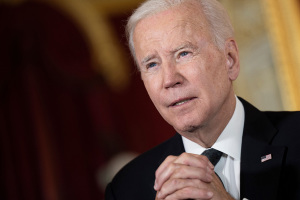Grand Canyon University slams Miguel Cardona's accusations of 'preying' on students
GCU demanded education secretary retract 'inflammatory' comments

Grand Canyon University (GCU) is refuting Education Secretary Miguel Cardona's recent comments before Congress accusing the school of "preying" on students and vowing to shut them down.
"Mr. Cardona’s inflammatory comments, which are legally and factually incorrect, are so reckless that GCU has no choice but to demand an immediate retraction," the school said in a statement provided to The Christian Post. "He is either confused, misinformed or does not understand the actions taken by his own agency."
Speaking during an April 10 House Appropriations Committee hearing during which Rep. Rosa DeLauro, D-Conn., characterized GCU as a "predatory for-profit college," Cardona laid out the measures by which he and his department are endeavoring to shutter the largest Christian university in the U.S., according to Fox News.

"They have a shiny brochure and a great commercial, but the product is not worth the paper it's written on," Cardona said. "We have students graduating $60-$70,000 in debt, only eligible for jobs making under $30,000. That, to me, is unacceptable."
Referring to GCU, Cardona explained how his department has increased enforcement "to go after these folks and really crack down on these behaviors," and he boasted that they "levied the largest fine in [Department of Education] history against a school that lied to students about the costs."
"We are cracking down on them, not only to shut them down, but to send a message across the country that you cannot prey on our students and expect to be successful," Cardona added.
Last October, the Department of Education slapped GCU with a $37.7 million fine, a penalty that dwarfed the $2.4 million fine levied against Penn State for not reporting Jerry Sandusky's sexual abuse of boys, as well as the $4.5 million fine against Michigan State for failing to address Larry Nassar's sexual assaults against hundreds of students.
An investigation by the department's Office of Federal Student Aid found that "GCU lied about the cost of its doctoral programs to attract students to enroll" to more than 7,500 current and former students.
The department claimed the university misrepresented the cost of its doctoral programs on its website by advertising that it would cost between $40,000 to $49,000 when fewer than 2% of graduates completed their course of study within that price range.
Required "continuation courses" often added $10,000 to $12,000 to the final cost, the department said. Investigators dismissed GCU's fine-print disclosures about the additional costs as inadequate notice of "substantial misrepresentations regarding cost."
During a press conference in November announcing GCU's appeal of the $37 million fine, GCU President Brian Mueller pointed to a 2022 report by the U.S. Government Accountability Office (GAO) examining broader financial disclosures in higher education. The GAO report found that 91% of the colleges reviewed "do not include or understate the net price in their aid offers," 41% of which do not provide a net price in their offer to students.
Echoing previous statements refuting the department's allegations against them, GCU emphatically pushed back against Cardona's comments in its most recent statement to CP, accusing the Biden administration of targeting Christian institutions.
"There are no factually supportable allegations that warrant an attempt to shut down GCU," the school said, noting how the Department of Education's conclusions are not shared by any of the other 26 regulatory and accrediting bodies that oversee them, including the Higher Learning Commission.
GCU pinpointed how the federal agency has "openly stated its disdain of for-profit institutions and, in order to label GCU a for-profit, intentionally disregarded the conclusions" of other accrediting agencies that approved their status as a nonprofit.
Founded in 1949 as a nonprofit by the Southern Baptist Convention, GCU became a for-profit institution in 2004 amid financial difficulties. The school subsequently sought to revert to its nonprofit status, a move that was approved by the IRS, Higher Learning Commission, State of Arizona, Arizona Private Postsecondary Board and NCAA Athletics.
In 2018, the Department of Education rejected their nonprofit status for the purposes of Title IV funding. The agency claimed GCU had not adequately separated from its publicly traded former owner, Grand Canyon Education, which still provides services to GCU and where Mueller still serves as CEO, according to Forbes.
GCU also alleged coordinated federal action against them, noting how the Goldwater Institute, a Phoenix-based conservative think tank, has sued to obtain relevant emails between officials in the Department of Education and other federal agencies regarding the fine against them.
In addition to the Department of Education's fine, the Federal Trade Commission (FTC) and the U.S. Department of Veterans Affairs launched five inquiries into GCU, which the school alleges was retaliation for the lawsuit they filed in 2021 regarding its nonprofit status. In January, the FTC also sued the school, alleging it deceived students and engaged in illegal telemarketing practices.
GCU also noted how Liberty University, the second-largest Christian university in the U.S., was threatened with a similar $37 million fine last year for alleged violations of the Clery Act. The Lynchburg, Virginia-based school settled with the Department of Education for $14 million in March.
GCU went on to claim that the Department of Education has repeatedly refused to provide them with evidence of intent or any verified student complaints regarding the doctoral program that reportedly forms the basis of the actions taken against them.
"Rather, their accusations are based entirely on their own subjective opinion of GCU’s financial disclosures for doctoral programs," the school said. "As Mr. Cardona’s comments confirm, those opinions reflect a deeply held bias against GCU, which has manifested itself in his Department’s selective and punitive enforcement actions against the university."
The Christian Post has reached out to the Department of Education for comment and will update this story if it responds.
GCU accused the Biden administration of hurling frivolous accusations and defamatory statements at them in an attempt to damage their reputation and to use their findings to seek loan forgiveness for students and impose onerous fees.
"In other words, regardless of the inevitable legal outcomes in GCU’s favor, the process becomes the punishment," they said.
Claiming the department's conduct toward them "goes well beyond normal regulatory activity," GCU said their situation "epitomizes the weaponization of federal agencies' power against a private Christian university."
"To borrow a term [the department] uses liberally to describe every for-profit institution it is trying to harm, the comments by Mr. Cardona and actions taken by his Department are predatory in nature and designed to achieve their own ideological agenda," it said.
GCU expressed confidence that an impartial court of law will ultimately "refute [the department's] extraordinarily thin allegations," and vowed to take the case to the U.S. Supreme Court, if necessary.
Jon Brown is a reporter for The Christian Post. Send news tips to jon.brown@christianpost.com




























